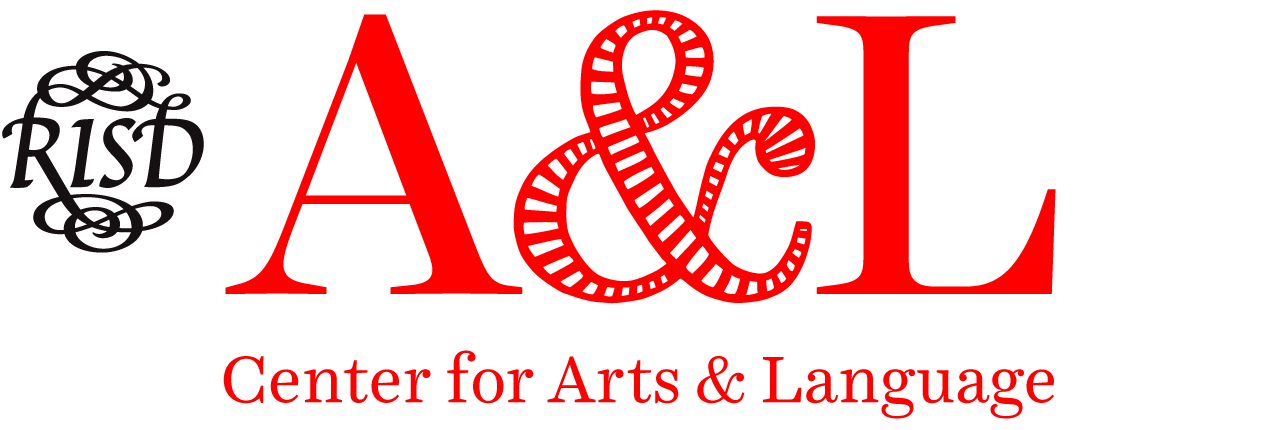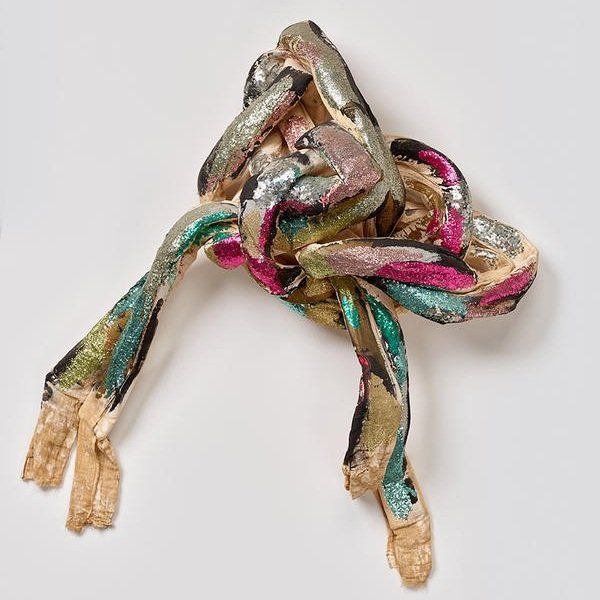Thesis Statements
A thesis statement establishes your purpose and point of view in argumentative or persuasive writing. It focuses the reader’s attention before the rest of the paper leads them step-by-step through the analysis and evidence.
In a finished paper, a thesis statement sakes your opinion concisely, sometimes in a single sentence, usually within the first paragraph of the essay. But this clarity of argument takes time to develop and refine.
Pushing an idea toward a thesis statement
Once you have made observations and considered their significance, look for similarities, common themes, and surprising contrasts. Explore some of your best, most intriguing ideas to get closer to a claim. Which ideas relate to one another? What do they add up to?
Here are two strategies for pushing your thinking toward an interesting and significant claim. The examples are about Lynda Benglis’s sculpture, Zita, part of her Sparkle Knot series.
Seems X, Really Y
Look beyond the obvious and find larger implications. Apply the same format to each new statement until you reach a more interesting claim.
The Sparkle Knot shape seems to be free-flowing, but is actually static and limp.
The shape seems to be static and limp, but is actually constrained and in pain.
The sculpture seems to demonstrate boundless possibilities, but it actually represents constraints.
The sculpture seems to demonstrate the boundless possibilities of art, but it actually represents the constraints and stigmatization applied to women artists.
So What?
Challenge your ideas by asking yourself why they matter. This will help you move from simply stating your conclusions to asserting their impact and relevance.
“The use of glitter in the Sparkle Knot sculpture is interesting because of all the social attachments to it: glitter is pretty, messy, ‘girly,’ a craft supply,party decor, and drag queen makeup.”
So what?
“The glitter probably represents all these things at once, rather than adding one simple meaning to the piece.”
So what?
“The use of glitter, among other materials in the Sparkle Knot series, calls up the multiplicity of identities and possibilities for women artists.”
Forming a Thesis Statement
Give yourself time to develop it. Thesis statements often grow and change as you research and write. When you get to your final statement, include:
the subject under discussion
your claim about it
the types of evidence or the logic you will use to prove it
how or why it matters
Strengthen your thesis statement by making it specific, arguable, narrow, defensible, original, and significant. See below for more details, including an example statement, a critique of it, and a revised statement for each quality.
Specific
Particular subject(s), details, types of evidence.
What content can we expect from this writing?
Ex: “This paper will address the characteristics of a responsible art museum.”
Which characteristics? Why are they being addressed, and how?
Revision: “Ethical procurement practices and community engagement instill trust in an art museum and improve its patronage.”
Arguable
Your claim; open to disagreement; needs explanation, proof.
What will I learn from you?
Ex: “Great Smoky Mountains is America’s most beautiful and most visited National Park.”
Is this only an opinion? Why does it matter that it’s the most visited?
Revision: “Great Smoky Mountins’ effective publicity, maintenance, and crowd management could improve other National Parks’ tourism while protecting their landscapes.”
Narrow
Limited content; precise areas of concern (population, time period, . . . ).
What can you accomplish in this piece?
Ex: “Art is essential to society.”
How can you cover this vast topic? What is at stake in this idea?
Revision: “Federal government should increase art funding even in hard economic times.”
Defensible
Within the means of your research and support materials.
Do you have enough convincing evidence for all these claims?
Ex: “Life for humans, animals, and plant life would be better in a colony on Mars.”
How do you know? What evidence could you provide for this?
Revision: “Human impact on Earth’s ecosystems has made survival difficult for all living species on the planet, making it our responsibility to counter climate change.”
Original
A new idea; something distinct from all other claims on the topic.
What new perspective or connections can you bring to the discussion?
Ex: “As Hannah Gadsby argues, Picaso’s misogyny cannot be overlooked in assessing his contributions to the art world.”
How is your argument different? What’s your fresh take?
Revision: “America’s obsession with celebrity makes it impossible to separate the art from even the most revered artist, leading to complication, but not cancellation.”
Significant
Impacting discourse within the topic, the genre, the field, etc.
Why does your claim matter outside this paper? this class? academia?
Ex: “Henry James’s Daisy Miller shows us that there really is no place like home.”
Anything more compelling to say? Something valuable to a broader context?
Revision: “In Daisy Miller, Daisy stands in both ignorance of and opposition to the European elite, who represent traditional rules of decorum.”

